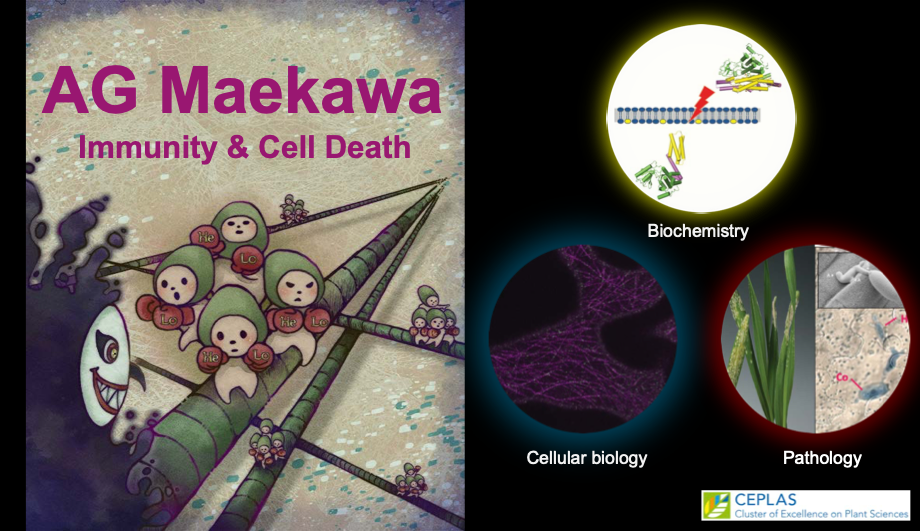Dr. Takaki Maekawa
Research focus
As in the animal innate immune system, it has become evident that plant cells attacked by pathogens release immunogenic signals, including metabolites, to alert neighboring cells in addition to distantly located cells to prepare for future pathogen invasions. Although neither a theoretical model nor experimental evidence is available to date, cell-to-cell communications are believed to create a spatial and temporal organization of immune signaling to combat pathogens. In particular, we are interested in studying immunogenic signals acting in a short distance that are released from dying or dead cells during host immune responses. Furthermore, based on our previous work (Jacob et al., 2018), calmodulin-binding transcription activators (CAMTAs) appear to play a central role in creating the aforementioned immunogenic signals. As CAMTAs are also integral to abiotic stress responses, a deeper understanding of the mechanism involved in cell-to-cell communications coordinated by CAMTAs will open up a new venue, which will allow the reconstruction of plant signaling and metabolic pathways, thus promoting plant health.
The five most important publications
- Mahdi, L.K., , Huang, M., Zhang, X., Nakano, R.T., Kopp, L. B., Saur, I.M., Jacob, F., Kovacova, V., Lapin, D., Parker, J.E., Murphy, J.M., Hofmann, K., Schulze-Lefert, P., Chai, J., and Maekawa, T.* (2020). Discovery of a family of mixed lineage kinase domain-like (MLKL) proteins in plants and their role in innate immune signalling. Cell Host Microbe. S1931-3128(20)30467-4. *Corresponding author
- Maekawa, T.*, Kracher, B., Saur, I.M., Yoshikawa-Maekawa, M., Kellner, R., Pankin, A., von Korff, M., and Schulze-Lefert P. (2019) Subfamily-Specific Specialization of RGH1/MLA Immune Receptors in Wild Barley. Mol Plant Microbe Interact. 32, 107-119. *Corresponding author.
- Saur, I.M., Bauer, S., Kracher, B., Lu, X., Franzeskakis, L., Müller, M.C., Sabelleck, B., Kümmelm F., Panstruga, R., Maekawa, T., and Schulze-Lefert P. (2019) Multiple pairs of allelic MLA immune receptor-powdery mildew AVRA effectors argue for a direct recognition mechanism. Elife. 8. pii: e44471.
- Jacob, F., Kracher, B., Mine, A., Seyfferth C., Blanvillain-Baufumé., S., Parker, J.E., Tsuda, K., Schulze-Lefert, P.*, and Maekawa, T.* (2018). A dominant-interfering camta3 mutation compromises primary transcriptional outputs mediated by both cell surface and intracellular immune receptors in Arabidopsis thaliana. New Phytol. 217, 1667-1680. *Co-corresponding authors.
- Lu, X., Kracher, B., Saur, I.M., Bauer, S., Ellwood, S.R., Wise, R., Yaeno, T., Maekawa, T.*, and Schulze-Lefert, P.* (2016). Allelic barley MLA immune receptors recognize sequence-unrelated avirulence effectors of the powdery mildew pathogen. Proc. Natl. Acad. Sci. U.S.A. 113, E6486-E6495. * Co-corresponding author

